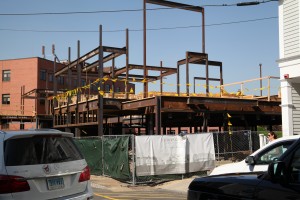New Canaan is a town far enough away from major roads to keep out corporate parks as well as a full lineup of the newest movies. It”™s where commuters take the peaceful environment over a shorter ride to Manhattan.
“We”™re a little bit off the beaten track, which keeps traffic down somewhat and allows us to be a little bit unique,” First Selectman Robert E. Mallozzi III said.
Without Interstate 95 or the Post Road cutting through town, it does not attract the amount of corporations or chain stores as does nearby Greenwich or Stamford, Mallozzi said. This puts a large emphasis on the town”™s village of brick buildings with mom-and-pop shops, restaurants and some chain stores that support the town of nearly 20,000 residents.

- Diane Lloyde Roth stands in L”™Armoire, her clothing and jewelry shop on Park Street. Photo by Danielle Brody
New Canaan also attracts shoppers from across the state line in nearby Lewisboro, Pound Ridge, Bedford and South Salem and those visiting the Philip Johnson Glass House.
Still, like other small towns, the residents need reminders to patronize their local businesses. Tucker Murphy, executive director of the New Canaan Chamber of Commerce, said while it may be more convenient and cheaper to buy online, people have to shop locally to maintain the town.
“People tell us they move to New Canaan for our schools and for our downtown,” she said. “When you spend money in the downtown you are directly affecting your property values if you”™re a resident here. When people look at our downtown, it is what makes our town so special and unique.”
“If you don”™t shop our stores, instead of seeing these beautiful windows that these merchants put together, you”™ll see ”˜for rent”™ signs. There”™s just no way around it and that affects our town.”
Diane Lloyde Roth, who has owned L”™Armoire, a designer clothing and estate jewelry shop on Park Street, for nearly 30 years, recalled a resident recently coming into the store for the first time after living in New Canaan for eight years.
“The problem you have with the younger people, they say they love the town but they don”™t support the town,” she said.
Roth said local store owners”™ personal touch is an advantage over shopping on the Internet or in Manhattan. Yet businesses need to find better ways to reach people, she said.
Murphy said she encourages businesses to cross-promote each other, market and know their brand. She said the chamber also does its part, planning more events to bring people into stores.
Five years ago the chamber launched iBlast (I buy local and shop in town), a program with a buy-in card that offered discounts. The next generation launched this year is #NCbuyslocal, an opt-in weekly newsletter that highlights merchants, announcements and events to connect the community with commerce.
Murphy said other business challenges are that longtime store owners are retiring and the long winter, which took a toll on retail. Even so, there are few empty storefronts, and new businesses plan to open in the next few months.
New Canaan is also seeing more mixed-use development downtown, as more people want to live closer to the town center, Mallozzi said. Some older residents are trading their large homes on three or four acres to be in walking distance of the town, and homes closer to town have appreciated in value, Mallozzi said.
“Over the last seven years there”™s been a migration of folks who”™ve bought somewhat out of town ”¦ to this whole lifestyle of being in town, being able to walk to the train station, being able to walk to restaurants,” he said.
Southbury-based Gatto Development Corp. is constructing Heritage Square, a building with retail and luxury residences on Forest Street, he said. He expects this kind of development to continue, especially closer to the railroad.
“We”™ve been extremely busy with building permits commercially and residentially to a degree I”™m quite impressed with,” Mallozzi said.
Some of the redevelopment in the area of town off the main village on Pine and Grove streets is being driven by hospital ancillaries coming into town, like the first immediate care center by Norwalk Hospital, wellness centers like the recently opened New Canaan Racquet Club and Halo, and new restaurants.
Mallozzi said the restaurant South End is planning to open a smaller version on Elm Street. New owners will modernize the longstanding Gates Restaurant & Bar, and a new executive chef, Luke Venner, is updating the menu at elm restaurant.
Other businesses in town are financial services, hedge funds, Unimin, an industrial minerals producer, and Bankwell, which Mallozzi said is becoming more of regional player.
Mallozzi hopes the next public project is the transformation of the New Canaan Playhouse, a movie theater on Elm Street the town took ownership of in 2007, before he came into office. He said he”™d like to see it have more artistic offerings, such as independent films, rather than a limited selection of first-run movies. He said conversations have started.
“Does the town want to invest two or three million dollars to correct the problems, or do we want to take a holistic look and bring in some partners, talk about the type of entertainment,” he said. About $2 million is allotted in the capital budget for renovation.
He hopes community members will create a nonprofit to transform the theater into a more meaningful center for the town, similar to the recent Ridgefield Playhouse renovation. He said he has already gotten about 10 calls from families.
Mallozzi is also chair of the board of finance, a role he said is rare for a first selectman. Most selectmen submit the budget and “that”™s it,” he said.
The town is taking on more debt this year to cover infrastructure projects to renovate old buildings and fix roads, he said.
“We”™ve taken on a lot of capital that quite frankly, in 2008, 2009, kind of got put by the wayside because of terrible economy,” he said. “We”™re kind of getting back on track.”
The nearly $18 million project to reconstruct and renovate the town hall, a 100-year old building that Mallozzi said was “basically condemned,” is almost finished. Town officials started to move in earlier this month.
While Mallozzi said the town has everything it needs, its biggest problem is the cost of entry. The average house is about $1.6 million, according to the assessor”™s office. Mallozzi said the town has stepped up its affordable housing efforts.
“We want to be in control of that conversation and not have developers hold us hostage,” he said.
While New Canaan”™s largest revenue source is housing at nearly 89 percent, according to last year”™s budget, the downtown is still a major draw and economic engine. Mallozzi hopes it can compete with the Internet, his biggest fear for the bucolic town.
“As long as this town remains attractive and the businesses and shopkeepers have a relationship with their customers … usually that whole experience will triumph,” he said.




















